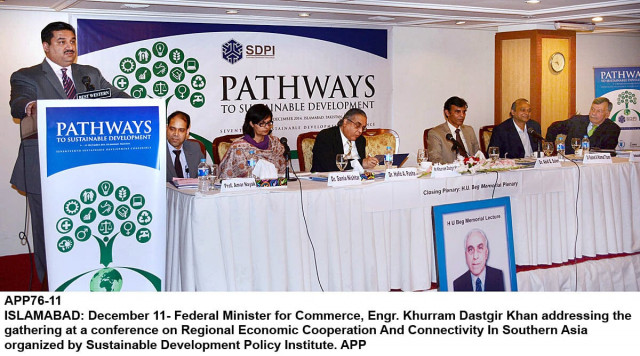Sustainable development: ‘Pakistan needs a policy shift to meet targets’
The deadline approaching closer and Pakistan virtually far from achieving its Millennium Development Goals.

With the deadline approaching closer and Pakistan virtually far from achieving its Millennium Development Goals (MDGs), speakers at a conference emphasized the need for revisiting policies of liberalisation. They said focus should be on social sector development strengthening of local government system, and a policy shift to development goals.
The experts from South Asian region were speaking at the 17th sustainable development conference that concluded here on Thursday with a vow to play a better role in building regional cooperation between Central and South Asian states. The three-day conference, ‘Pathways to sustainable development’ was organised by the Sustainable Policy Institute (SDPI).
“Pakistan has no option but to follow the path of inclusive growth and sustainable development,” former finance minister Dr Hafiz Pasha said in his keynote speech at the H.U Beg memorial plenary session.
Presenting a bleak picture of the current scenario, he said “Food inflation and the escalating prices of flour that has risen by 50 per cent in real terms over the last few years, are the issues which need immediate attention of the government,” Pasha said.
According to Pasha, unemployment has reached to 12 per cent and three million people are entering the poverty bracket every year. The real household income of the top 20 per cent has gone up by 40 per cent, whereas the income of those belonging to the lowest 20 per cent, have only risen by six per cent, Pasha said.
“The top one per cent holds 20 per cent of the country’s land,” Pasha maintained.
Criticising the biased and skewed banking system, he said lending facilities have worsened, and currently 86 per cent of the credit goes to one per cent of the big borrowers. Censuring the tax system, he said now only 700,000 people are filing tax returns, whereas a few years back the figure was one million. The total amount of tax exemptions is Rs900 billion.
He also questioned the PSDP allocations saying “this year only 30 per cent of the budget was allocated for water and energy whereas the budget for highways has been doubled. “We can live without highways, but cannot make progress without electricity,” he said.
Although prices of wheat, sugar and electricity have decreased in the world, in Pakistan they are going up.
For the improvement in the sorry state of affairs, he suggested holding of local government elections, abolition of SROs, increase in PSDP allocations for water and energy and encouragement of small and medium enterprises.
Minister for Commerce and Industry Khurram Dastgir, however, said that despite some difficulties, South Asia with democracies in place is entering into a new era of development and prosperity.
Addressing the participants as chief guest, he stated that Pakistan’s economy could be strengthened by connecting it with other Central Asian states through trade, electricity grids and roads.
“Central Asia South Asia Electricity Transmission and Trade Project”, he insisted, “will connect the regional countries and help build cooperation in various fields”.
He further said that South Asia was the least integrated region. “Due to the lack of connectivity and proper infrastructure the region has been unable to work to its full potential,” he said citing the European model which integrated smaller economies in large economies.
“Pakistan liberalised trade with India,” he said and expressed the hope of “working on economic cooperation once the political environment becomes conducive”.

Moreover, he stated that the government was developing three land ports — Chaman, Wagah border and Turnham — which would open further doors of cooperation between Pakistan and its neighbours.
Dr Rashed Mahmud Titmur of the Dhaka University said that non-engagement and non-alliance at regional level couldn’t prove to be beneficial for all the countries and now it’s time to move towards regional cooperation. He added that 50 per cent labour is underutilised in South Asia.
“Policies like liberalisation and privatisation have also failed in the region therefore, all the countries need to revisit them,” he said.
SDPI Executive Director Dr Abid Qaiyum Suleri said that as we have graduated from MDGs to SDGs, independent researchers and academia must rise up to the challenge and give policy advice to national, regional and global governance forums. The move towards SDGs should envision a more responsible role of a democratic state, he added.
Dr Sania Nishtar said that MDGs were developed for the aid system with clear time-bound targets. On the other hand, SDGs are not developed for the aid system and this will require countries to come-up with strategies to achieve those goals by themselves, she maintained.
Dr Tariq Banuri, a professor at Utha University in USA was awarded the SDPI’s Lifetime Achievement Award in recognition for his efforts.
On the occasion, SDPI launched the Pakistan Data Portal a joint project with Alif Ailaan. The data portal is an online tool for the sharing and dissemination of all data on education in Pakistan.
Published in The Express Tribune, December 12th, 2014.



















COMMENTS
Comments are moderated and generally will be posted if they are on-topic and not abusive.
For more information, please see our Comments FAQ